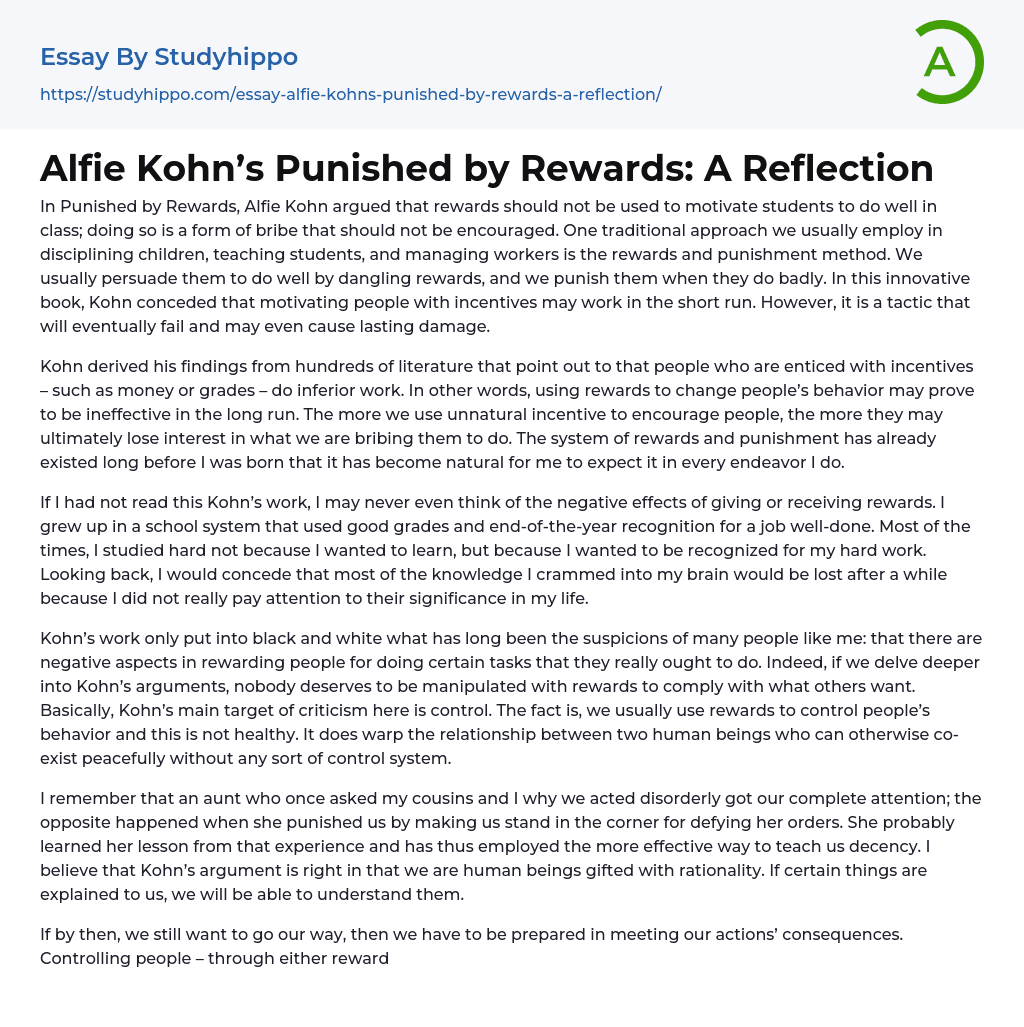

Alfie Kohn’s Punished by Rewards: A Reflection Essay Example
In Punished by Rewards, Alfie Kohn argued that rewards should not be used to motivate students to do well in class; doing so is a form of bribe that should not be encouraged. One traditional approach we usually employ in disciplining children, teaching students, and managing workers is the rewards and punishment method. We usually persuade them to do well by dangling rewards, and we punish them when they do badly. In this innovative book, Kohn conceded that motivating people with incentives may work in the short run. However, it is a tactic that will eventually fail and may even cause lasting damage.
Kohn derived his findings from hundreds of literature that point out to that people who are enticed with incentives – such as money or grades – do inferior work. In oth
...er words, using rewards to change people’s behavior may prove to be ineffective in the long run. The more we use unnatural incentive to encourage people, the more they may ultimately lose interest in what we are bribing them to do. The system of rewards and punishment has already existed long before I was born that it has become natural for me to expect it in every endeavor I do.
If I had not read this Kohn’s work, I may never even think of the negative effects of giving or receiving rewards. I grew up in a school system that used good grades and end-of-the-year recognition for a job well-done. Most of the times, I studied hard not because I wanted to learn, but because I wanted to be recognized for my hard work. Looking back, I would concede that most of the knowledge
I crammed into my brain would be lost after a while because I did not really pay attention to their significance in my life.
Kohn’s work only put into black and white what has long been the suspicions of many people like me: that there are negative aspects in rewarding people for doing certain tasks that they really ought to do. Indeed, if we delve deeper into Kohn’s arguments, nobody deserves to be manipulated with rewards to comply with what others want. Basically, Kohn’s main target of criticism here is control. The fact is, we usually use rewards to control people’s behavior and this is not healthy. It does warp the relationship between two human beings who can otherwise co-exist peacefully without any sort of control system.
I remember that an aunt who once asked my cousins and I why we acted disorderly got our complete attention; the opposite happened when she punished us by making us stand in the corner for defying her orders. She probably learned her lesson from that experience and has thus employed the more effective way to teach us decency. I believe that Kohn’s argument is right in that we are human beings gifted with rationality. If certain things are explained to us, we will be able to understand them.
If by then, we still want to go our way, then we have to be prepared in meeting our actions’ consequences. Controlling people – through either reward or punishment – will only undermine our sense of sensibilities. Instead of being able to help, we may only distort other people’s perception of certain things when we start giving them rewards for things that they
are willing to do even without these incentives. In the end, it is still more constructive to be rational and to give explanations on why we should do certain things, rather than to force people to do them in lieu of rewards.
- Age Of Enlightenment essays
- Ethos essays
- Time essays
- Acceptance essays
- Meaning Of Life essays
- Reality essays
- Natural Law essays
- Political Philosophy essays
- Utilitarianism essays
- Existence essays
- Free Will essays
- Good And Evil essays
- Confucianism essays
- Relativism essays
- Conscience essays
- Environmentalism essays
- Empiricism essays
- Epistemology essays
- Ethics essays
- Existentialism essays
- Human Nature essays
- Individualism essays
- Metaphysics essays
- Philosophy Of Life essays
- Transcendentalism essays
- Truth essays
- Destiny essays
- Determinism essays
- Fate essays
- Functionalism essays
- Philosophers essays
- Pragmatism essays
- Future essays
- Child Observation essays
- Critical Reflection essays
- Teaching Philosophy essays
- Personal Philosophy essays
- Action Speak Louder Than Words essays
- Can Money Buy Happiness essays
- Values of Life essays
- Ethical dilemma essays
- Normative Ethics essays
- Virtue Ethics essays
- Belief essays
- Deontology essays
- Moral essays
- Virtue essays
- Work Ethic essays
- Henry David Thoreau essays
- Carl Jung essays



